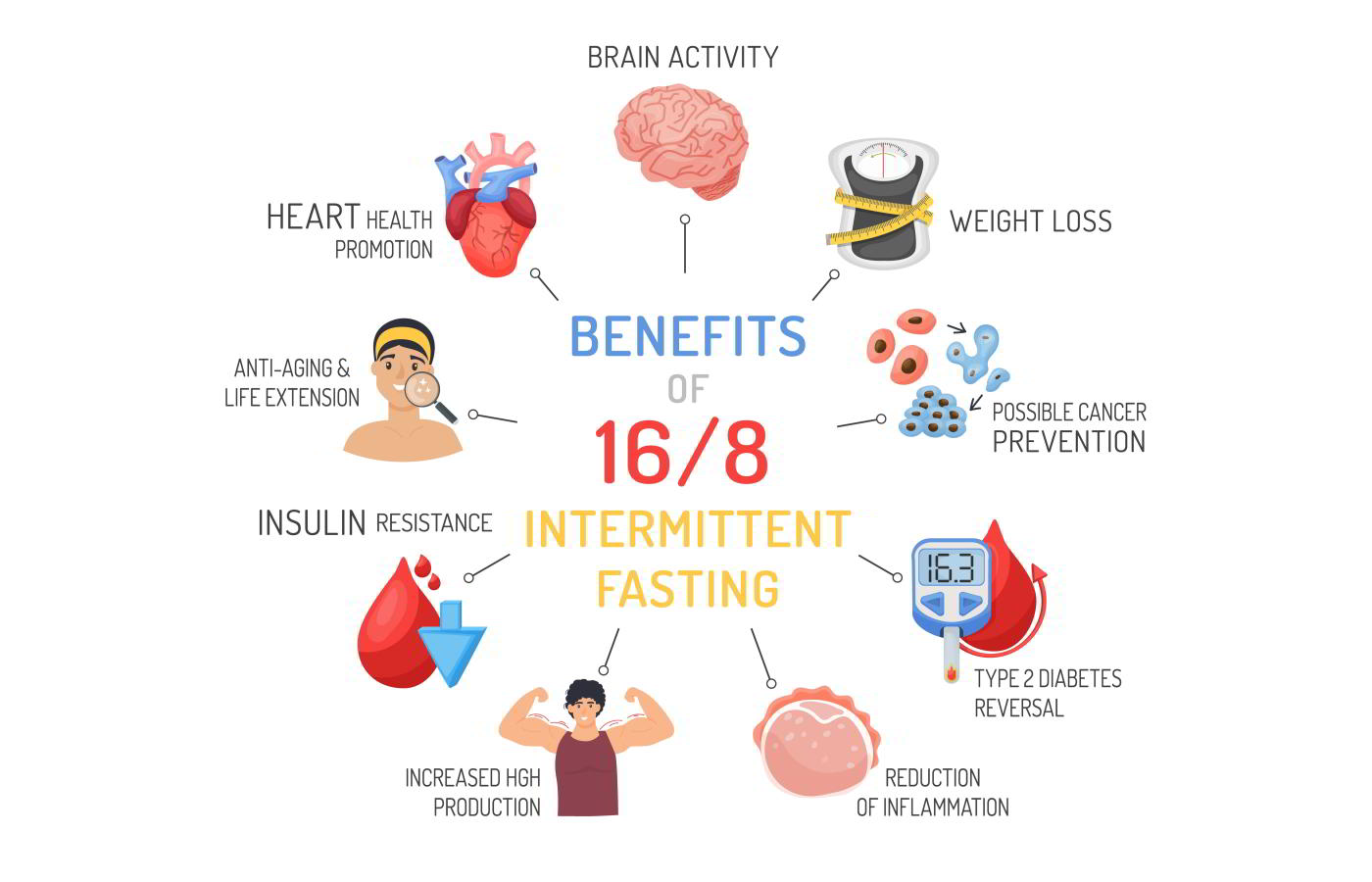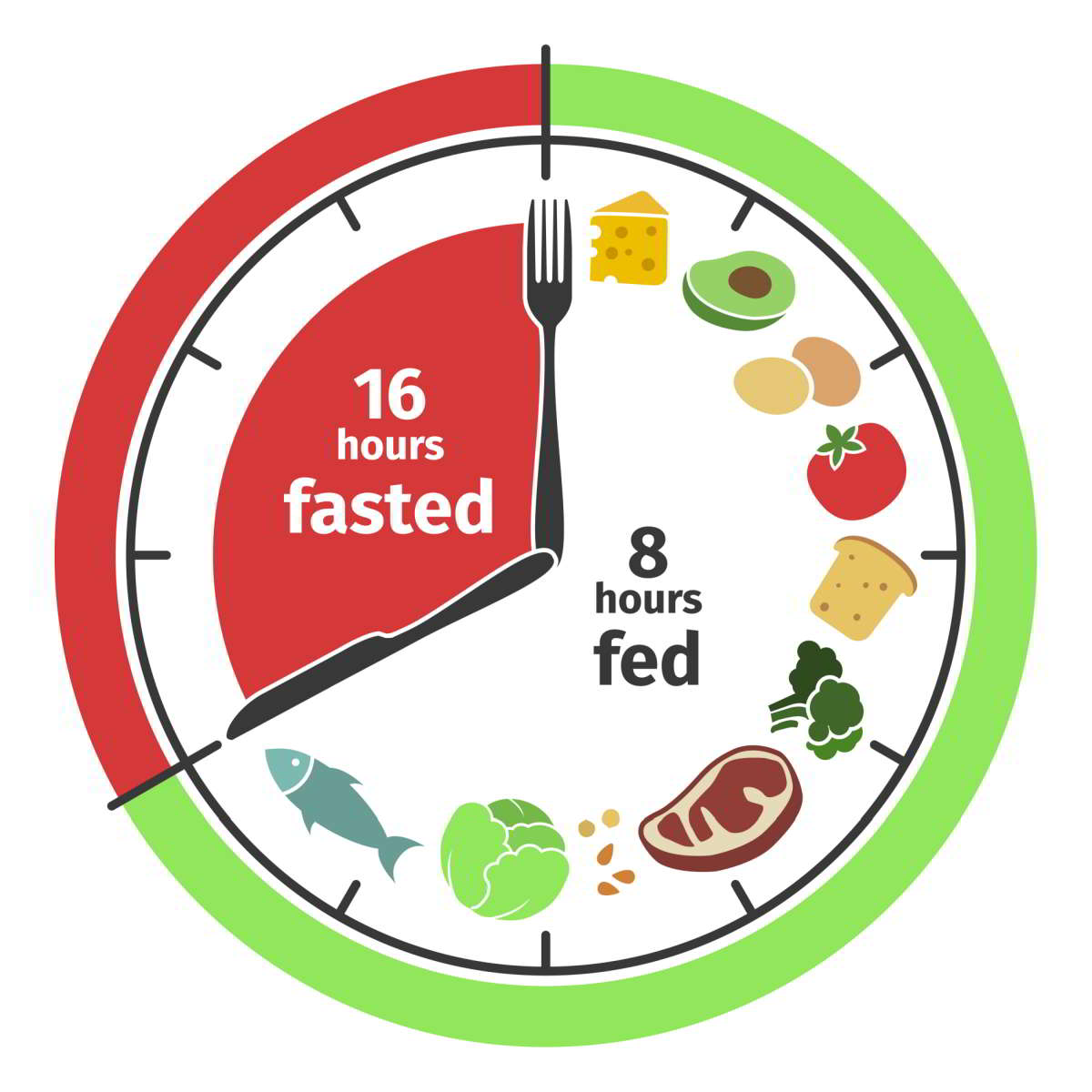Intermittent fasting, or IF, is a dietary regimen that has become increasingly popular in recent years. The reason for this popularity? Well, some research suggests that it may have benefits beyond weight loss, like improved cognitive and cardiac health.
This short article will look at IF and how it works, any health benefits or drawbacks, whether there is a link with blood pressure and how to start or maintain a fasting lifestyle.
What is intermittent fasting?
Intermittent fasting (IF) involves periods of eating and fasting within a regular schedule and is often used to improve metabolic health, promote weight loss, and provide other benefits, such as increased energy levels. It typically involves reducing calorie intake to a certain number of hours per day, or even a number of days per week. For those that follow this regimen as part of a daily routine, the 16:8 approach is fairly popular. In this version, over a 24-hour period, participants only eat during an 8-hour window and fast for the remaining 16 hours (with one benefit being that you can sleep during the 16 hour fasting window). If the 24-hour version doesn’t work for you, a popular alternative is following the diet over a week: the 5:2 method. In this variation, individuals eat normally for five days of the week and only have one small meal per day on the two remaining days. It is important to note that during fasting, water and other zero-calorie beverages are allowed to ensure hydration is maintained.
The good, the bad and the BP
IF can provide several health benefits, including lowered blood pressure. However, there are also drawbacks and limitations that will be explored below.
Advantages of intermittent fasting
Induced cellular repair processes through autophagy
Autophagy is a natural cellular process that occurs within cells and breaks down or recycles any old, damaged or unnecessary cellular components. It’s important for maintaining cell health and can help prevent disease with benefits shown for patients having type 1 and type 2 diabetes, cancer and cardiovascular disease. When fasting, the body starts a mechanism to remove cellular waste, which is also called autophagy, and a study published in Human Nutrition and Metabolism has suggested that IF can help activate the autophagy process.
Lowering the risk of (and helping to manage) type 2 diabetes
IF can be useful for giving a helping hand when it comes to managing type 2 diabetes and has been shown to improve insulin sensitivity not only as part of a weight loss plan, but also on its own. This means that IF could be used by those without diabetes to improve health or reduce the risk of diabetes in later life. This effect is suggested to be related to reduced insulin production in the liver during fasting periods.
Better brain health
A 2022 study has shown that IF can be beneficial for the brain through a range of different mechanisms, including the release of different hormones or an improved gut microbiome. Benefits are suggested to include enhanced cellular stress resistance, synaptic plasticity, and neurogenesis (which are all good things).
IF and blood pressure
The many mechanisms that fasting activate in our body can influence cardiovascular health at large, including blood pressure (BP). However, one particular benefit is its influence on angiotensin II. Angiotensin is the body’s hormone that helps regulate blood pressure, and comes in four types (I to IV). Type II is an active version of this hormone that causes the muscular walls of small arteries (arterioles) to constrict, which can increase blood pressure. In addition, angiotensin II can trigger adrenal glands to release aldosterone and the pituitary gland to release antidiuretic hormone (ADH). The combination of these effects cause the kidneys to retain sodium in the bloodstream, which causes water retention that increases blood volume and therefore blood pressure. Regulation of angiotensin II levels is therefore important for maintenance of a healthy heart and body.
Pitfalls and concerns of IF
While IF is regularly touted for its health benefits, it can have undesirable side effects, such as:
- Headaches
- Lethargy
- Mood swings
- Dizziness
- Constipation
It is also potentially a risk factor for disordered eating and psychopathology, with the correlations between IF and disordered eating increasingly receiving scientific attention.
Finally, IF is not for everyone and is not recommended if:
- You require a higher calorie intake – Individuals who are underweight, struggling with weight gain, under 18 years of age, pregnant or breastfeeding should not attempt an IF-based diet.
- You have digestion issues – Eating large meals, which is often required for the types of IF that include a long fast, can cause gastrointestinal (GI) stress. This is particularly concerning for people with irritable bowel syndrome (IBS) and already have a more sensitive gut.
- You require medication that must be taken with food.
- You have a weakened immune system – Individuals who have recently experienced a major illness or are currently ill should not begin IF without first consulting a general practitioner (GP) or doctor
How do I start intermittent fasting (IF) for better cardiovascular health?
Plan your meals
Organising meals is a significant part of IF and can provide support for staying on course with a fasting routine. By planning meals, it is possible to ensure that your body is receiving the necessary nutrients and food groups throughout the day. This is important as it can help maintain energy levels during the fast and ensures adequate calories are ingested. Planning meals also helps prevent overindulgence during the eating phase, which can help avoid weight gain. Finally, planning meals can help with budgeting as the items required to prepare meals are known in advance.
Eat healthier foods
Eating healthier foods is a key part of IF because it requires consumption of quality, nutrient-rich food for optimal health. In addition, planning ahead means that processed, sugary, and unhealthy foods can be avoided.
It is well-known that a diet rich in nutrient-dense foods such as vegetables, fruits, lean meats, seafood and unsaturated fats can provide essential nutrients for energy and overall health. This has the added benefit that it reduces cravings and increases energy levels. In addition, ensuring that the foods eaten release their energy more slowly, i.e. have a low glycemic index, can mean that you feel full for longer periods of time, making intermittent fasting easier.
Eat more minerals
While following an IF diet, eating more minerals is a great way to ensure that you are getting the most out of your fasting period. Minerals are essential for a healthy body and can help to boost your energy levels, regulate your body temperature and keep your bones, teeth and muscles strong. They can also provide essential micronutrients while also helping to reduce inflammation, improve digestion and boost the immune system.
Lower salt intake
Lowering salt intake, or more specifically lowering sodium intake, is beneficial for fasting in a variety of ways. In particular, the sodium in salt can cause water retention causing the feeling of bloating, which can be uncomfortable.
Reducing salt intake may help regulate the body’s water balance more efficiently and reduce the risk of dehydration, which can be especially important for those who are fasting for an extended period of time. Furthermore, reducing salt intake has the potential to help reduce high blood pressure, which can be beneficial for those who are fasting for health reasons. By lowering salt intake, intermittent-fasters can experience greater success and comfort during their fasting periods.

What’s next?
Intermittent fasting has been shown to be an effective way of managing blood pressure with many benefits including weight reduction, lower blood pressure and improvements in insulin sensitivity. By following an intermittent fasting plan, individuals can benefit from improved heart and brain health and a reduction in their overall risk of cardiovascular disease.
Get the latest on intermittent fasting and blood pressure management. Sign up for our newsletter and receive expert insights and tips today!
Monitoring blood pressure daily while undertaking intermittent fasting is important to identify any trends and concerns as, even though intermittent fasting may lower your blood pressure, it should not be used in place of medical recommendations. At Aktiia, we have developed a wearable blood pressure monitor that takes a number of readings during the course of the day. If you want to learn more, look into our 24/7 blood pressure monitor or contact us today.
Disclaimer: This article is for educational purposes only and neither contains nor replaces medical advice. Consult your physician before making any changes to your diet or lifestyle. If you feel you are at risk, or struggle with an eating disorder, visit Beat Eating Disorder’s helpfinder page to learn more about support around you.
Sources:
Varady, K. A., Bhutani, S., Klempel, M. C., Kroeger, C. M., Trepanowski, J. F., Haus, J. H., Hoddy, K. K. and Calvo, Y. (2013). Alternate Day Fasting for Weight Loss in Normal Weight and Overweight Subjects: A Randomized Controlled Trial. Nutr. J., 12 November 2013 – https://doi.org/10-1186-1475-2891-12-146
Angiotensin, Cleveland Clinic, 27 June 2022 – https://my.clevelandclinic.org/health-articles-angiotensin (accessed October 2024)
Grajower, M. M. and Horne, B. D. (2019). Clinical Management of Intermittent Fasting in Patients with Diabetes Mellitus, Nutrients, 18 April 2019 – https://doi.org/10-3390-nu11040873
Brocchi, A., Rebelos, E., Dardano, A., Mantuano, M. and Daniele, G. (2022). Effects of Intermittent Fasting on Brain Metabolism, Nutrients, 17 March 2022 – https://doi.org/10-3390-nu14061275
Glycemic Index and Diabetes, Diabetes UK – https://www.diabetes.org.uk/living-with-diabetes-eating-carbohydrates-and-diabetes-glycaemic-index-and-diabetes (accessed October 2024)
Halt the Salt: 5 ways to Cut Down on Sodium and Improve your Heart Health, National Heart, Lung and Blood Institute, 13 February 2023 – https://www.nhlbi.nih.gov/news-halt-salt-5-ways-cut-down-sodium-and-improve-your-heart-health (accessed October 2024)
Demirci, E., Çalapkorur, B., Celik, O., Koçer, D., Demirelli, S. and Şimsek, Z. (2023). Improvement in Blood Pressure After Intermittent Fasting in Hipertension: Could Renin-Angiotensin System and Autonomic Nervous System Have a Role?, Brazilian Society of Cardiology, 14 May 2023 – https://doi.org/10-36660-abc-20220756
Intermittent Fasting Diets for Type 2 Diabetes Remission, Diabetes UK, 29 January 2024 – https://www.diabetes.org.uk/about-diabetes-type-2-diabetes-remission-intermittent-fasting-for-remission (accessed October 2024)
Allaf, M., Elghazaly, H., Mohamed, O. G., Fareen, M. F. K., Zaman, S., Salmasi, A.-M., Tsilidis, K. and Dehghan, A. (2021). Intermittent Fasting for the Prevention of Cardiovascular Disease, Cochrane Database of Systematic Reviews, 29 January 2021 – https://doi.org/10-1002-14651858-CD013496
Clifton, K. K., Ma, C. X., Fontana, L. and Peterson, L. L. (2021). Intermittent Fasting in the Prevention and Treatment of Cancer, CA: A Cancer Journal for Clinicians, 12 August 2021 – https://doi.org/10-3322-caac21694
Dong, T. A., Sandesara, P. B., Dhindsa, D. S., Mehta, A., Arneson, L. C., Dollar, A. L., Taub, P. R. and Sperling, L. S. (2020). Intermittent Fasting: A Heart Healthy Dietary Pattern? Am. J. Med., August 2020 – https://doi.org/10-1016-jamjmed-202003030
Vasim, I., Majeed, C. N. and DeBeor, M. D. (2022). Intermittent Fasting and Metabolic Health, Nutrients, 31 January 2022 – https://doi.org/10-3390-nu14030631
Blumberg, J., Hahn, S. L. and Bakke, J. (2023). Intermittent Fasting: Consider the Risks of Disordered Eating for your Patient, Clin. Diabetes and Endocrinol., 21 October 2023 – https://doi.org/10-1186-s40842-023-00152-7
Ganson, K. T., Cuccolo, K., Hallward, L. and Nagata, J. M. (2022). Intermittent Fasting: Describing Engagement and Associations with Eating Disorder Behaviors and Psychopathology among Canadian Adolescents and Young Adults, Eating Behaviors, December 2022 – https://doi.org/10-1016-jeatbeh-2022-101681
Erlangga, Z., Ghashang, S. K., Hamdan, I., Melk, A., Gutenbrunner, C. and Nugraha, B. (2023). The Effect of Prolonged Intermittent Fasting on Autophagy, Inflammasome and Senescence Genes Expressions: An Exploratory Study in Healthy Young Males, Hum. Nutr. Metab., June 2023 – https://www.sciencedirect.com/science-article-S2666149723000063
What are the Benefits of Intermittent Fasting? Medical News Today, 29 November 2023 – https://www.medicalnewstoday.com/articles-323605 (accessed October 2024).



